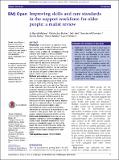Files in this item
Improving skills and care standards in the support workforce for older people : a realist review
Item metadata
| dc.contributor.author | Rycroft-Malone, Jo | |
| dc.contributor.author | Burton, Chris | |
| dc.contributor.author | Hall, Beth | |
| dc.contributor.author | McCormack, Brendan | |
| dc.contributor.author | Nutley, Sandra Margaret | |
| dc.contributor.author | Seddon, Diane | |
| dc.contributor.author | Willians, Lynn | |
| dc.date.accessioned | 2014-06-12T11:01:02Z | |
| dc.date.available | 2014-06-12T11:01:02Z | |
| dc.date.issued | 2014-05-30 | |
| dc.identifier.citation | Rycroft-Malone , J , Burton , C , Hall , B , McCormack , B , Nutley , S M , Seddon , D & Willians , L 2014 , ' Improving skills and care standards in the support workforce for older people : a realist review ' , BMJ Open , vol. 4 , no. 5 , e005356 . https://doi.org/10.1136/bmjopen-2014-005356 | en |
| dc.identifier.issn | 2044-6055 | |
| dc.identifier.other | PURE: 127007389 | |
| dc.identifier.other | PURE UUID: 10816454-c3cd-4365-b080-f61517876590 | |
| dc.identifier.other | Scopus: 84901948163 | |
| dc.identifier.other | WOS: 000336976900076 | |
| dc.identifier.uri | https://hdl.handle.net/10023/4875 | |
| dc.description | This work is supported by the National Institute Health Research (NIHR) Grant no. 12/129/32. This project is commissioned by the NIHR Health Services and Delivery Research Programme. | en |
| dc.description.abstract | Introduction: In the context of a population that is growing older, and a number of high-profile scandals about care standards in hospital and community settings, having a skilled and knowledgeable workforce caring for older people is an ethical and policy imperative. Support workers make up the majority of the workforce in health and social care services for older people (aged 65 years and over), and yet little is known about the best way to facilitate their development. Given this gap, this review will draw on evidence to address the question: how can workforce development interventions improve the skills and the care standards of support workers within older people’s health and social care services? Methods and analysis: As we are interested in how and why workforce development interventions might work, in what circumstances and with whom, we will conduct a realist review, sourcing evidence from health, social care, policing and education. The review will be conducted in four steps over 18 months to (1) construct a theoretical framework, that is, the review’s programme theories; (2) retrieve, review and synthesise evidence relating to interventions designed to develop the support workforce guided by the programme theories; (3) ‘test out’ our synthesis findings and refine the programme theories, establish their practical relevance/potential for implementation and (4) formulate recommendations about improvements to current workforce development interventions to contribute to the improvement of care standards in older people’s health and social care services, potentially transferable to other services. Ethics and dissemination: Ethical approval is required to undertake this review. Knowledge exchange activities through stakeholder engagement and online postings are embedded throughout the lifetime of project. The main output from this review will be a theory driven framework for skill development for the support workforce in health and social care for older people. Trial registration number: CRD42013006283. | |
| dc.format.extent | 7 | |
| dc.language.iso | eng | |
| dc.relation.ispartof | BMJ Open | en |
| dc.rights | This is an Open Access article distributed in accordance with the Creative Commons Attribution Non Commercial (CC BY-NC 3.0) license, which permits others to distribute, remix, adapt, build upon this work non-commercially, and license their derivative works on different terms, provided the original work is properly cited and the use is non-commercial. See: http://creativecommons.org/licenses/by-nc/3.0/ | en |
| dc.subject | RA0421 Public health. Hygiene. Preventive Medicine | en |
| dc.subject | SDG 3 - Good Health and Well-being | en |
| dc.subject.lcc | RA0421 | en |
| dc.title | Improving skills and care standards in the support workforce for older people : a realist review | en |
| dc.type | Journal article | en |
| dc.description.version | Publisher PDF | en |
| dc.contributor.institution | University of St Andrews. School of Management | en |
| dc.identifier.doi | https://doi.org/10.1136/bmjopen-2014-005356 | |
| dc.description.status | Peer reviewed | en |
| dc.identifier.url | http://bmjopen.bmj.com/content/4/5/e005356.full.pdf+html | en |
This item appears in the following Collection(s)
Items in the St Andrews Research Repository are protected by copyright, with all rights reserved, unless otherwise indicated.

